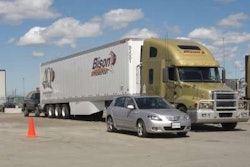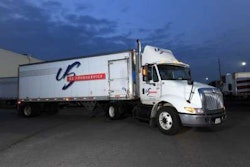The recessioin is playing havoc with business fundamentals
You don’t see many hostile takeovers in Corporate America these days. Even if there were some juicy targets, such events usually come with debt leveraging, and that’s simply not feasible for too many companies now. So think back if you can to those heady days when companies would offer huge allotments of stock or raise obscene amounts of financing in order to outbid competitors.
If you remember those times, then you probably remember the concept of the poison pill. Often taking the form of a shareholder rights plan or some other tinkering with corporate structure, a poison pill more broadly refers to a strategy of making an attack or takeover unattractive because the victor would suffer undesirable consequences. Today, the economy in general and the trucking equipment market in particular is something of a poison pill protecting some struggling carriers. They are surviving when traditional business principles should dictate their failure.
Consider today’s trucking industry from the lender’s perspective. If a fleet owner has hit hard times and can’t make timely payments, what’s the rational thing to do? In most years, lenders would want to take back equipment on which they have liens fairly promptly so as to preserve maximum value. After all, trucks and trailers are depreciating assets, so if you repossess now rather than six months from now, you save 50,000 or 60,000 miles and the wear and tear that comes with those miles.
But today, there’s a glut of equipment and not much to suggest a near-term surge in demand. Even an impending engine technology change, which normally would make used trucks all the more valuable, hasn’t seemed to make much difference yet. Various analysts think that even with the aging fleet, truck buying could lag a rebound in freight demand.
Hence, depressed equipment value is the poison pill. If the lender takes back the truck, it now has a troubled asset on its hand – one that it probably couldn’t sell for anything near the balance of the truck owner’s loan. So the best-case scenario – or, perhaps, the least-worst-case scenario – is to grant the truck owner a forbearance agreement with extended loan terms that might call for greatly reduced or even no payments in the near term. If freight turns around, the trucking company can return to making payments, often under terms more favorable to the lender than before. If not, the lender is no worse off than he would be taking the equipment now.
Reports of this dynamic being widespread in trucking are anecdotal, although there is some statistical evidence to suggest it. According to Avondale Partners, failures among trucking companies with five or more power units totaled about 480 in the first quarter of 2009 – about half the number that failed in the first quarter last year despite an economy that today clearly is in worse shape. On the other hand, with diesel prices dropping rapidly in the fourth quarter last year, carriers still were benefiting from the cash flow bonus offered by the lag between the booking of fuel surcharges and their payment to carriers. So the full impact of lax lenders on capacity isn’t clear.
A number of trucking companies further report that weak competitors – now freed from the pressure to make timely note payments on their tractors – are driving down freight pricing in various markets. Again, proving the case is complicated by the fact that business conditions in trucking are so poor, shippers have leverage on rates anyway.
Regardless, the continued operation of very weak carriers is a challenge to industry health even if they aren’t taking advantage of lower costs afforded by forbearance agreements to set below-market rates. Just by continuing to operate, they are impeding a full capacity correction. The irony might just be that when the situation improves and carriers must face the longer-term consequences of their renegotiated deals, many then will be forced to shutter their operations. Once the poison wears off, defense becomes much trickier.












